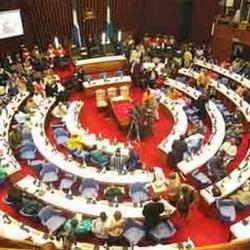By Tanu Jalloh
Budget Advocacy Network (BAN), supported by National Endowment for Democracy, has released its analyses of Sierra Leone’s Audit Service reports on the activities of the country’s National Revenue Authority (NRA) for 2011 and 2014.

By Tanu Jalloh
Budget Advocacy Network (BAN), supported by National Endowment for Democracy, has released its analyses of Sierra Leone’s Audit Service reports on the activities of the country’s National Revenue Authority (NRA) for 2011 and 2014.

By Tanu Jalloh
Very soon Sierra Leone will have, as a policy directive or legislation, some incentives to boost local production and introduce trade regulations that encourage consumers to patronise goods manufactured in country - ‘Made in Salone’.

By Tanu Jalloh
In its latest risk and industry analysis BMI Research, based in London, has revealed that Sierra Leone has further cemented the West African region’s strong mining outlook after Shandong’s planned investment of $700 million.
It however warned of a danger that ore prices could moderate by end of this year or early next year which could even put the whole investment at risk, possibly a blow that could weaken “an economy that has only recently started recovering from the Ebola crisis.”

By Tanu Jalloh
Sierra Leone on Monday introduced tough new measures including massive cuts in a bid to tackle the current economic crisis in the country.
The announcement, which followed an emergency cabinet meeting, also proposed stern measures that will force “all business outfits to pay outstanding arrears of taxes within 30 days”.

By Tanu Jalloh
Country economist at the World Bank office in Sierra Leone says the Ebola epidemic in 2014/2015 did not directly affect the iron ore sector in the country, citing drop in prices of commodities as a major reason.
Yusuf Bob Foday recently told journalists at their Howe Street offices in Freetown that before the Ebola outbreak in 2014 iron ore sector players, African Minerals and London Mining, could not produce much and the price per tonne of iron ore had dropped from US$103 in 2012 to below US$40 in 2014.

By Tanu Jalloh
During a recent week-long oversight outreach the parliamentary accounts committee encouraged local councils to improve on their revenue generating strategies for sustainable governance and improved service delivery.
The apparent fear of systems failure, stemming from some outstanding queries put forward by the Auditor General’s Report of 2014, was that these local governance structures risked dissolution instead of devolution. If this happens, it might negatively affect local economic development.